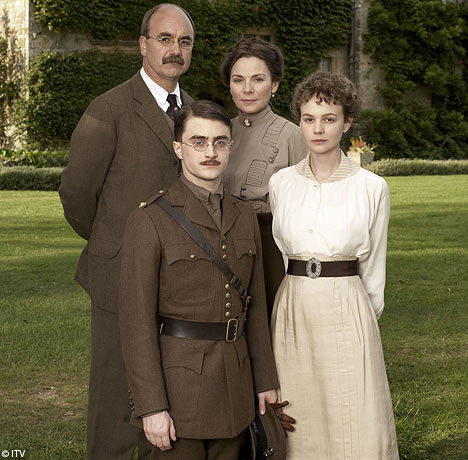Today was a quiet day. We enjoyed the mild weather and blue skies during our walks. We even cleaned up our lawn chairs and sat on the patio for a while. (Cleanup necessitated by birds--nuff said.)
We worked on some paperwork. We always have a stack of things that need taking care of--usually requiring frustrating phone calls. Today was no exception. Ken called Medicare. He got some of the answers he wanted, but the call was cut off. Discouraging.
Tonight we watched a Masterpiece Classic titled "My Boy Jack" about Rudyard Kipling. His son was extremely myopic and rejected by the British navy and army in the early days of World War II. Kipling pulled strings to get his son accepted despite this disability. The story examines the motives and family relationships and the consequences of Jack's death one day after his eighteenth birthday. Daniel Radcliffe does a great job portraying Jack. David Haig, who portrays Rudyard Kipling, also wrote the screenplay. It was unexpectedly moving.

My Boy Jack Synopsis
Warning: This synopsis contains plot spoilers
It's 1915, and Great Britain is at war. Aged only 17, writer Rudyard Kipling's son John "Jack," like most of his generation, is swept up in the enthusiasm to fight the Germans; a sentiment stoked vigorously by his father. However, Jack is cripplingly short sighted and the Army has rejected him twice, rendering him too myopic even for an Army suffering thousands of casualties a week and desperate for recruits. Yet Rudyard is determined that his son should go to the frontlines, like countless other sons, and fight for the values that he, Rudyard, espouses so publicly.
Using his fame and influence, Rudyard persuades Lord Roberts on his deathbed to get Jack a commission in the Irish guards. This intervention is barely tolerated by Rudyard's American wife Carrie and daughter Elise, as they disagree Jack should fight, and fear for his safety on the front line.
Jack is instantly popular with his troop — he is a great leader and trains tirelessly to overcome the disability that is his eyesight. Six months later, Jack sails to France as a lieutenant. In his pocket is a spare pair of spectacles and written permission from his father to travel to the frontlines before his eighteenth birthday. On the day of his eighteenth birthday, Jack is told they will be deployed the following day. Days later, the Kipling family are informed that Jack is "missing believed wounded," news which devastates them and leaves Elise furious at her father for his part in Jack's fate.
Desperately clinging to the hope that their son is still alive, Carrie and Rudyard scour hospitals and obsessively track down and interview survivors. Two years later, Jack's friend and fellow Irish Guard Private Bowe arrives at Bateman's, the Kiplings' home in Sussex. Suffering from shell shock, he finally describes to the assembled family what had happened in the Battle of Loos. The searching and the hoping were over.
In September 1915, Jack Kipling was killed in action. He died in the pouring rain, unable to see a thing. He had been in France for three weeks. Jack remained on the list of soldiers "missing believed wounded" for two years. The effect on Rudyard and Carrie was incalculable.
Kipling wrote a poem commemorating this grief, also titled My Boy Jack.
“Have you news of my boy Jack?”
Not this tide.
“When d’you think that he’ll come back?”
Not with this wind blowing, and this tide.
“Has any one else had word of him?”
Not this tide.
For what is sunk will hardly swim,
Not with this wind blowing, and this tide.
“Oh, dear, what comfort can I find?”
None this tide,
Nor any tide,
Except he did not shame his kind —
Not even with that wind blowing, and that tide.
Then hold your head up all the more,
This tide,
And every tide;
Because he was the son you bore,
And gave to that wind blowing and that tide!



0 comments:
Post a Comment